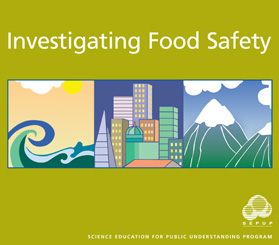Investigating Food Safety

Consumers’ concerns over food safety are broad. Students explore food-borne illness as they investigate the growth of yeast, a common fungus that is used to model other effects of pathogenic microorganisms. They examine different uses of chemical additives, including their inhibition of microbial growth. Students then explore how chemical additives can be used to slow the oxidation of fresh fruit and to enhance the nutrient content of foods. They learn how foods can be tested for the presence of chemical residues, such as pesticides. Finally, they evaluate the use of different food preservation techniques intended to improve food safety. Students are assessed on their ability to use evidence and identify trade-offs when making a decision.
Each module includes a Teacher’s Guide containing reproducible student pages and a kit containing the equipment required to conduct the activities with five classes of 32 students. The Teacher’s Guide provides specific strategies to facilitate and assess student learning.
Overview
Shown below is the table of contents for the teacher’s guide, which contains reproducible student pages.
Shown below is the table of contents for the teacher’s guide, which contains reproducible student pages.
Introduction
Module at a Glance
Guide to the Module
Activity 1: Introducing Food-Borne Illness
Student Investigation: A Few Food-Borne Illnesses
Activity 2: Optimum Conditions for Microbial Growth
Student Investigation: The Best Microbe Meal
Activity 3: Inhibiting Microbial Growth
Student Investigation: Make It Stop Growing
Activity 4: Chemicals in Foods
Student Investigation: The Chemical Solution
Activity 5: Preventing Oxidation
Student Investigation: No More Brown Bananas?
Activity 6: Vitamin C Titration
Student Investigation: A Day-Old Drink
Activity 7: Testing for Pesticides
Student Investigation: Pesticides on Peas
Activity 8: Investigating Food Safety
Student Investigation: Safe or Sorry?
Appendix A: Materials
Appendix B: Background
Appendix C: Assessment
Appendix D: Glossary

